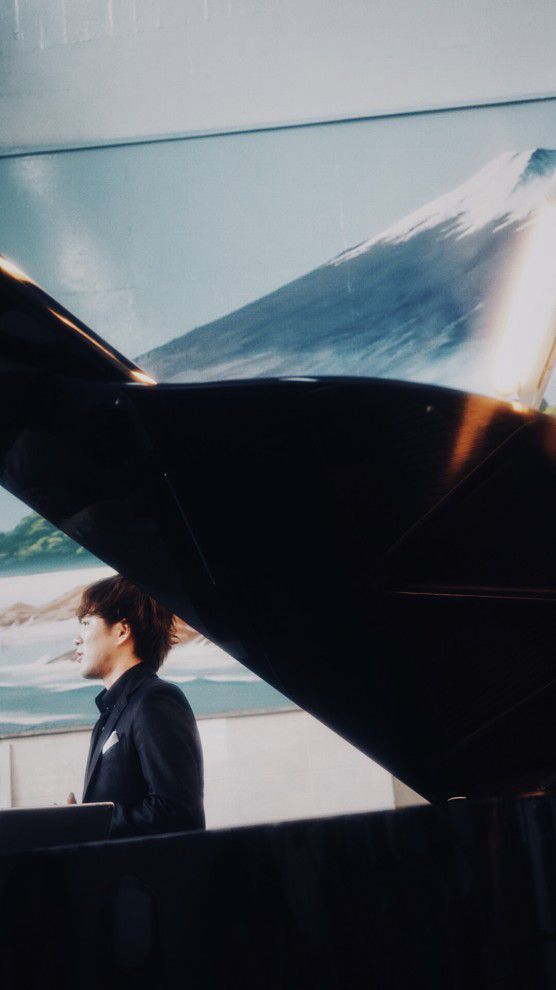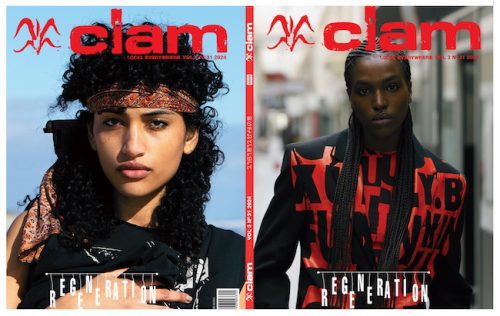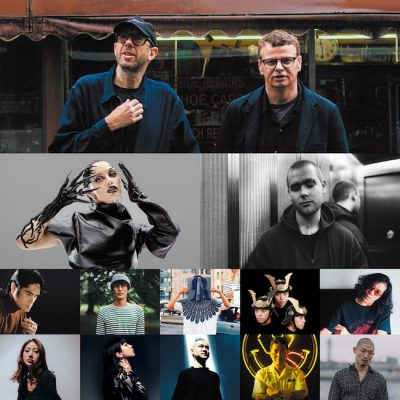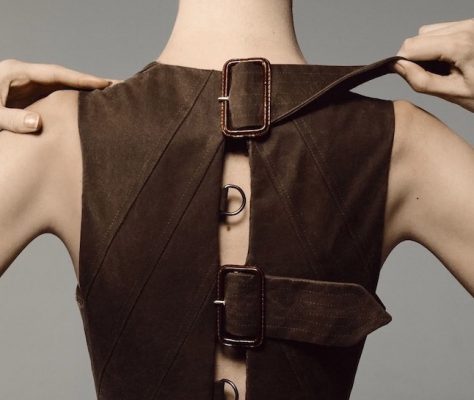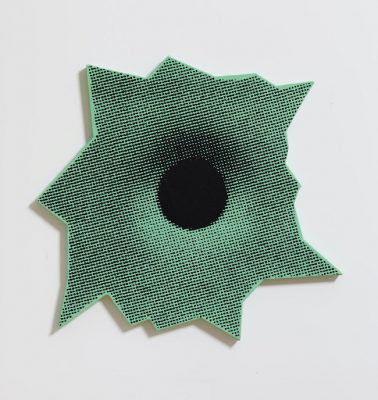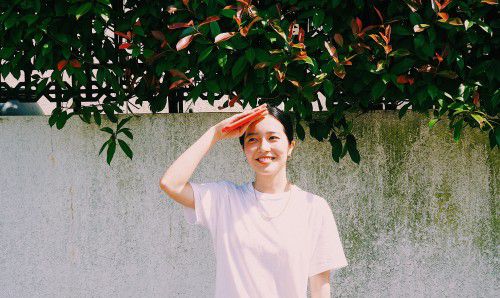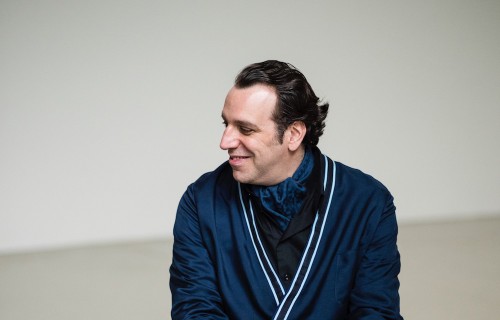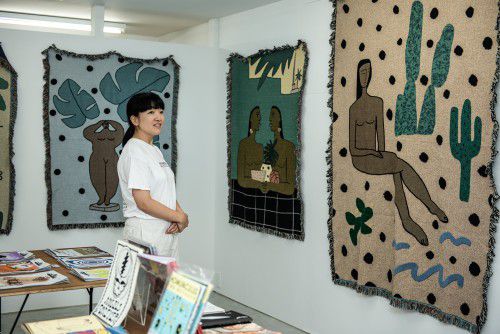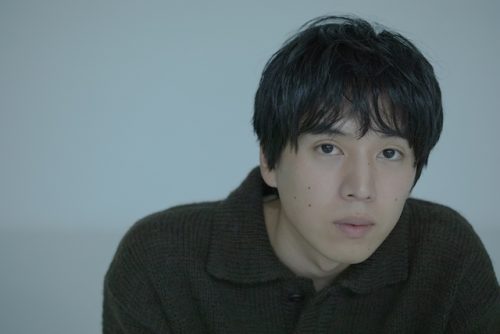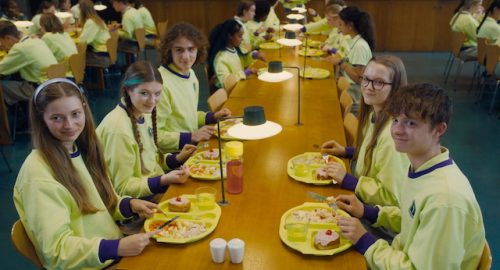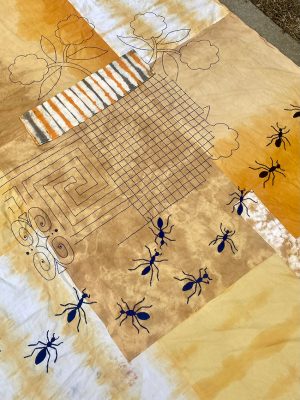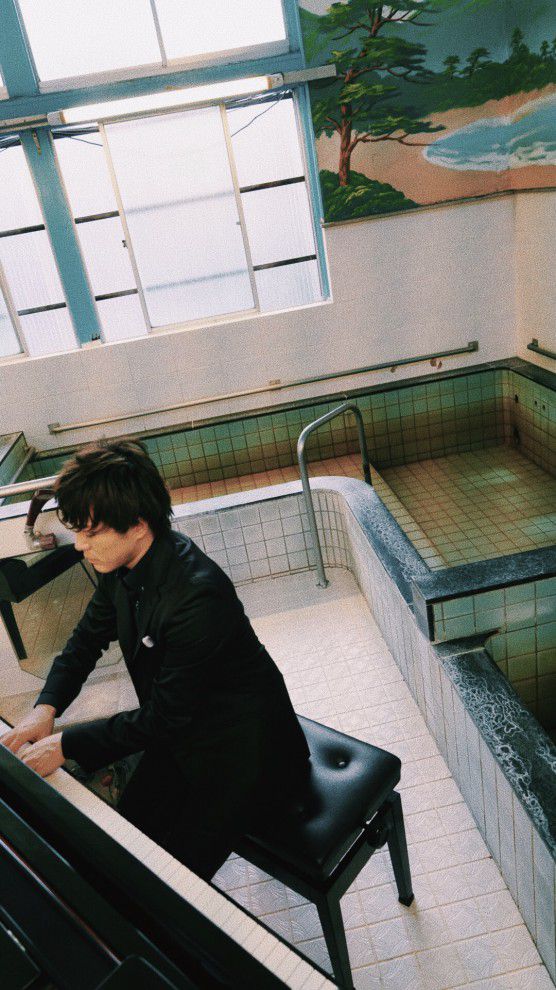
東京音楽大学院を首席で修了し、イタリアで音楽を学んだ米津真浩。日本に戻った彼は、近年銭湯でピアノコンサートを行っている。ショパンやラフマニノフ、カプースチンのような偉大な作曲家の作品を独自の解釈で演奏する彼に、音楽との接し方から銭湯でのコンサートという驚愕のアイデアについてまでを聞いた。
Graduated with first-class honors from Tokyo College of Music and studied abroad in Italy, the charming pianist Tadahiro Yonezu recently held a piano concert in the sentou (Japanese public bath). He has made his own special interpretation on several pieces of work of significant composers like Chopin, Rachmaninoff and Kapustin. We have the honor here to ask him about his idea of the extraordinary concert in sentou, which is probably the first one in the world.
——最初に、自己紹介をお願いします。
米津「はじめまして、米津真浩です。千葉県出身1986年2月14日バレンタインデー生まれです(笑)。ピアノをはじめたきっかけは幼稚園の先生が弾いていたピアノを聴いて弾いてみたくなったから。両親は全く音楽とは無縁の職業でしたし、高校も普通科でした。その後東京音楽大学へ進学しましたが、こうしてピアノを弾く生活を夢見ていた訳ではなく、将来何かしら音楽の仕事につけたら…………という漠然としたビジョンしかなかったですね。音楽大学へ進学し、同じように音楽が大好きなメンバーや素晴らしい先生方に囲まれ、こんなに音楽づくしで幸せな生活でいいの?ってくらい毎日が充実し楽しかったです。音楽に対してディスカッションできる人で埋め尽くされている音楽大学って、もう本当にただただ楽しいだけの場でしたね(笑)そんな環境でクラシック音楽の奥深さを知るようになり、どっぷりはまっていきました。ただ、もともとピアニストを目指していた訳ではなかったので基礎もやってなければ知識も皆んなに比べて圧倒的にない。負けず嫌いな性格なので皆んなに追いつくためにもそこから必死に練習しましたよ。好きなことだから苦痛には感じていなかったけれど。その後大学院へ。大学院修了後は母校である東京音大で3年程後進の指導をさせていただいた後、イタリアのイモラ音楽院へ留学しました。イタリアでの生活は、うん、僕はこっちの方が合ってるかも!ってくらい居心地が良くて、もちろん言葉の壁やヨーロッパでのアジア人の生活のし難さ等大変なこともあったけどそれ以上にイタリアの生活のテンポ感っていうのかな、マイペースな感じとか(笑)すごく自分とマッチしていました。音楽院ではクラシック音楽発祥の地ならではの深く、そして細やかなレッスンで今まで何してきたんだろうってくらい新しい発見の嵐で……。ここまでやるのか〜ここまで突き詰めるのか〜と、とにかく驚きばかりでした。そしてひたすらピアノづくしの生活でした。朝起きる→練習→朝食→練習→昼食→イタリアだとシエスタがあるのでお昼の2、3時間音出し不可のためその間に家事→練習→夕食→練習→ご褒美のワインタイム(笑)→就寝。毎日ほんっとこの繰り返しでした。ちなみに現在の生活は……本番が入っていない日は朝から晩までレッスンの嵐ですね」
——First of all, please introduce yourself. (where did you grow up, how did you get started with piano; how was life at Tokyo College of Music/Italy; what is your daily life like, how long is your practice time everyday, etc)
Yonezu: Hi, my name is Yonezu Tadahiro. I was born on Valentine’s Day in Chiba in 1986 (laugh). Got the chance to learn piano when I watched the teacher played at my kindergarten. Neither of my parents was a professional musician, and I went to a public high school but not an institution specialized in the study of music. After that I went to Tokyo College of Music, but it wasn’t the dream life for me as a pianist. There was only a vague vision of things and I didn’t know what to do in the future. To be in a music college and surrounded by professionals who share the same interest sounded like a happy life. It was surely fulfilling. I have had so much fun having good conversations with classmates and professors (laugh). I have learned so much about classical music and I was actually drawn to it. However, it had been quite tough because I didn’t aim to become a pianist, unlike everyone else. Part of me really hated losing to my peers in college and so I practiced as much as I possibly could. I didn’t feel like it was painful , because it was something I really loved doing. After that was graduate school, and I spent another three years at Tokyo College of Music. I studied abroad at Imola Music Academy in Italy after that. I think I liked the life there a lot and it had been quite matching with me. Of course, there was the barrier between communications and it was hard living as an Asian among all the Europeans. Besides all that, I still found myself enjoying my life there. The sense of living freely was very inspiring. Lessons at the academy, which was where classic music got its root, were amazingly great. I am still astonished by the details of the new discovery from what I have learned to this day. I had my routine which basically was based on my practice schedule. I would wake up in the morning and practice, have my breakfast and practice, have my lunch and back to practice. There was a tradition called siesta in Italy that prohibits loud music for two or three hours during daytime and so I would use that time to clean up my room. And then back to practice, and dinner followed by another round of practice. And I would reward myself with wine before going to bed (laugh).That was pretty much how I spent my days. And for now, I am working on lessons nonstop whenever there is no concert or recital.
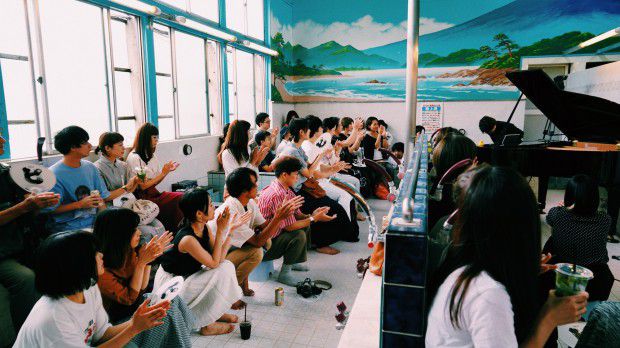
——「銭湯のピアニスト」のアイデアはどのように生まれましたか?(恐らく史上初クラシック音楽を銭湯で披露する方になられたと思うのですが、そこに至るまでのプロセスをシェアしていただけますか)
米津「はい、このお話しをするにはイタリア時代に遡らないといけないのですが、まず僕がイタリア時代に感じたことの一つに『日本とイタリアの音楽を聴く機会とスタンスの違い』というものがありました。イタリアでは路上、街中、駅、時には電車の中まで音楽にあふれていて、更には野外フェスでクラシックのリサイタルも開催されていました。そのリサイタルでは近所の人がジェラートを食べながら、またある人はお酒を飲みながらじっくり音楽に耳を傾けていました。きっと日本人と同様にクラシックの知識がある人ばかりではないと思いますがそれでも、それぞれが自由なスタイルで楽しんでいるように感じました。またイタリアではシエスタ(昼休み)には皆んな各々好きな音楽をかけゆったりとした時間が流れていたのも印象的です。そういえば、僕が練習していたら近所の方が訪ねてきて、『ベートーヴェンの曲、弾いてくれよ!』とリクエストが来たこともありました。てっきり苦情かと思ってたので驚きました(笑)。もちろんモラルや騒音問題もありますし、日本で同じことができる環境ではないのはわかります。ちょびっとせっかちな国民性、仕事に追われじっくり音楽を聴く時間もないと思いますし、電車など移動中に聴こうと思っても強弱の幅の広いクラシック音楽ではまず弱音部は聞こえないでしょうし(笑)。だからといってじゃあクラシックのコンサートに行ってみようとは絶対ならないと思うんですよね。普通に生活していたら聴く機会はまずないだろうし、興味を持つきっかけすらない。TVで耳にするくらいで生音を体感する機会はないだろうし、クラシックのコンサート自体謎すぎてむしろ何着ていけばいいの?ドレス?スーツ?って方がほとんどだと思うんですよ。だからどんなきっかけでもいいので一度生でクラシック音楽を体験してみてほしいし、そこで何かしらちょっとでも感じることがあれば嬉しいなと。とにかく大好きなクラシック音楽をまず一人でも多くの方に聞いていただける機会がほしいし興味を持っていただけるきっかけを作りたいなと思っていたんです。で、その話を僕のアーティスト写真を撮っていただいたカメラマンのフジイセイヤさんに話したら、是非紹介したい面白いメンバーがいるので今度皆んなで飲みましょうと。で皆んなで集まって飲んだ時も僕の想いを話したら皆さんが賛同してくださって後の銭湯のピアニストチームができたわけです。なぜ銭湯か?というお話しはその飲み会の時のダジャレ?から来ました(笑)。初対面だったコピーライターの長谷川哲士さんが『米津さんってなんかキャッチコピーみたいなのないんですか〜』とおっしゃったので『僕、事務所のデビューコンサートの時”危ないピアニスト、現る!!”ってタイトルを事務所につけられました(笑)』って話したら長谷川さんが「え?どの辺が危ないの?戦いながら、戦闘しながらでもピアノ弾くの?……戦闘……せんとう……銭湯?……お!!銭湯のピアニストどうでしょう!!!』……。はい、この瞬間銭湯のピアニストが誕生したのです(笑)。実際僕も銭湯が好きだし、銭湯って近所の人が気軽に入りにくるでしょ?だからそういった気持ちでコンサートにも来てほしいなと思って僕の想いに銭湯はぴったりな会場だなと。さらによく響きそうだし音響ももしかしたら抜群?って思って。そうしたらカメラマンのフジイさん、コピーライターの長谷川さんに続きデザイナーの井上裕一さん、プロデューサーの橘しゃっくさん、映像ディレクターの藤沢基樹さん、ヘアメイクのwataさんという各業界で大活躍中の方々がサポートメンバーに加わってくださって。本当にトントン拍子し開催することになりました。僕一人の力ではどうにもならなかったことで皆様のお力添えには本当に心から感謝しています。しかもみんな『大人になってこんなにワクワクすることなかなかないよね〜』と楽しんでくださって(笑)」
——How and why did you come up with the idea of “Pianist of Sentou”? (since it’s probably the first one ever done in the history of classical music concert, would you tell us more about the process?)
Yonezu: Sure. I will have to trace it back to the time in Italy. First of all, I felt like there was a huge difference of how classical music is performed and perceived between Japan and Italy. I heard music almost all the time when I was in Italy. On the streets, at the station and even on the trains. And there were music festivals and recitals held outdoors. People would come to the recital with gelato and a glass of wine in each hand. Of course there were people who aren’t familiar with classical music, like how it is in Japan. But they were enjoying themselves to the music in their own way. And the siesta gives people a chance to listen to what they love while feeling the time slowly passes, that was impressive as well. I just remembered that there was this one time when someone in the neighborhood came and asked me if I could play a piece of Beethoven. I was shocked because I thought that they were trying to complain about it (laugh). Admittedly moral issues and the problems of the “noises” would make everything different. Japan is not a perfect environment for that kind of atmosphere to enjoy music. People barely have time to listen to music and even while listening to classical music on the train, I can’t really hear the notes in the lower range (laugh). Consequently it is almost impossible for people to go to an actual concert. Living their life normally is stopping them from building an interest in classical music. Hearing the sound from TV is not the right way to get the experience, and concerts are confusing as well. People wouldn’t know what to wear. A formal dress? Suit? It is quite a lot. I wanted to help creating an opportunity for people to actually have an authentic experience of classical music. I would be so happy if people could get to know about classical music more through an event. So I was talking to this photographer who helped taking my artist profile photo, and I asked him to introduce me to people who shared the same interest in holding an event like that. And so we gathered for a drink, that was when we came up with the idea of “Pianist of Sentou”. Believe it or not, it started from a Japanese pun (laugh). Tetsuji Hasegawa, who was the copyrighter, met me for the first time and asked about how I didn’t have a catchphrase. I told him that people at my agency would call me “a dangerous pianist” (laugh). And he asked how come I was dangerous, “like that you fight when you play the piano?Is it like a battle?(senntou) Battle?…….Senntou……Sentou!! Oh you are the pianist of sentou!” That was when we got the name and idea for the event (laugh). I actually like sentou (public baths) a lot. I thought that people could just come as they want and it could be the perfect place for a concert. And the sound effect is going to be great for sure. And so I started working on the event with the photographer Fujiyi, the copywriter Hasegawa, the designer Yuichi Inoue, the producer Tachibana Shakku, the video director Fujisawa Maki and the stylist Wata. I couldn’t be able to do it without their help. I am really grateful. Also everyone was quite happy with the plan because we all haven’t done something that would make us so excited ever since we have become grown-ups (laugh). So that was a lot of fun.
——銭湯での演奏はどのように感じましたか?コンサートホール等とはどう違いましたか?(米津さんがカスプーチン変奏曲Op.41を演奏している最中に、観客のどなたかが間違って水の蛇口を開いてしまったのですが、一瞬びっくりさせるような出来事でしたが、結果としては思いのほかプラスの効果があったのでは。このような予想外のエピソードに関してはどう思われますか?
米津「銭湯での演奏ですがまず想像を絶するくらい音響がよくて驚きました。来てくださったお客様からは『教会で聴いているような上から降ってくる響き』や『コンサートホール含め今までで一番良い音響』などというコメントもいただきました。演奏者とお客様の距離が非常に近いためサロンのように身近に感じられる迫力とホールのような美しい音響と今までに味わったことのない感覚でした。そして、絶対にホールではあり得ないそのようなアクシデントも含め銭湯でやる醍醐味なんじゃないかなと。素晴らしい効果音でしたね(笑)。やはり音楽って時間の芸術で、その時間を共有することが喜びの一つだと思うんです。なのでアクシデントもスパイスになって今回の銭湯でのひと時が忘れられない思い出の一つとなっていただけていたら嬉しいです」
——How did you feel about playing in the sentou? How was it different from playing in a concert hall or an auditorium? (Someone accidentally opened up the switch of the water tap while you were playing Kapustin’s Variation Op.41, it was a bit chaotic but turned out to be surprisingly good. What do you think about that as an unexpected episode?)
Yonezu: I was impressed by the sound of the echo in sentou. Audience who came all said that it was like listening to music in a church, the sound flows down from above. And they thought that it was even better than the experience in a concert hall. The distance with the audience was also pretty close and so it was more like a salon but with the perfect sound just like it is in a concert hall. I would say that accident was perfect and it gave out the experience people would never have the chance to get in a concert hall. It was surprisingly good as a sound effect (laugh). I was so glad that I got to share that time with everyone by playing music. It definitely was impressive and I will always remember it.
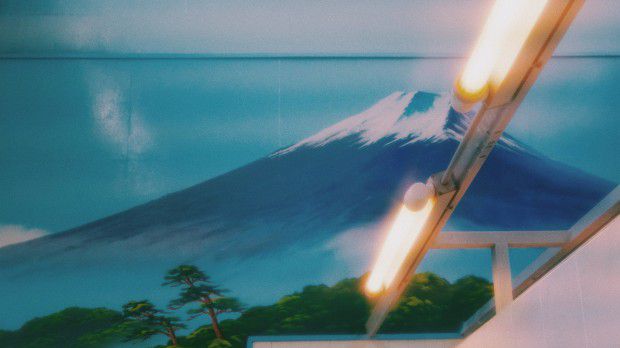
——演奏中は観客は飲食や携帯の持ち込み、撮影等も許容されていて、クラシックコンサートとは全く真逆でして、とても斬新でした。それに関してはどう思われましたか?米津さんにとってどのような経験になりましたか?
米津「そこに関しては難しい問題だと思うのですが、うーん、今回は純粋にクラシック音楽を実際生で聴いてもらいたい、気軽に聴いてほしいという企画ですし、聴き方がわからないって方も大勢いらっしゃると思ったのであえてなんでもOKに設定させていただきました。音楽の楽しみ方って人それぞれ自由でいいと思っています。中にはお酒を飲みながら聞きたい人もいるだろうし、コンサートホールに着飾っていくということが好きな方もいるでしょう。様々です。だからこそ周りの方への気遣い、モラルのある聴き方をしていただければ基本なんでも良いと思います。ただクラシック音楽は伝統的で神聖な音楽ですし、演奏する側もそういった精神性を含め一音一音に想いを込めて弾いています。そこもクラシック音楽ならではの魅力の一つなので、ぜひじっくりと繊細な箇所まで聴いていただけたらな〜という思いはあります。でもでも、来ていただいた方はなんとなく感じ取っていただけてると思うのですが、良い意味での緊張感があると思うんですよ、クラシック音楽って。だから『お、飲食OKなんだ〜 !!ちょっとくらいしゃべってもいいんだ!!じゃ気軽に喋りながらでも聴こう〜』って来ていただいた方もいざ演奏が始まると自然と静かに聴いてくださるんですよ(笑)。そうなんです、静かに聴かなきゃ、お行儀よく聴かなきゃってイメージの方多いと思うんですが、実際は『しなきゃ』ではなく自然とそうなるんだと思います。これこそクラシック音楽の力です(笑)。銭湯でコンサート中『飲みながら食べながら聴いてくださいね〜』と僕が話しても全然してくれなかった(笑)。うん、皆様クラシック音楽のマジックにかかっていた証拠です(笑)」
——Audience were allowed to eat and drink, and even use their cellphones to take photographs while you were playing. That was very new since it is quite the opposite people do when at a concert. What do you think about that? How was the experience like for you?
Yonezu: That was surely something new and I bet people would get confused with it. Well, I just wanted to make this event so that people could enjoy classical music purely. Audiences also included people who aren’t familiar with classical music and so I thought it is better not to set any rules. People should be allowed to enjoy themselves at the concert in their own ways. If one wants to drink or wants to wear something delicate, it is all fine. I just thought that you can only focus on enjoying the music when you stop caring about how people around you sees you. There was only one thing that was important and that is, to think of classical music as something that is sacred. To feel that every note is filled with the spirit when hearing the musicians play. That is the charm of it and people would want to listen to every detail until they understand what it actually is. I feel like the audience had a grasp of what I am saying, and the whole exprience was also a little tense. Even though I had said that “it is okay if you want to eat or drink! also feel free to talk if you want to!”(laugh), people would still remain silent once the performance started. It is not like some rules you make for people to obey, but like people would naturally want to be quiet while listening to the music. That is the real thrill of classical music. Thankfully the audiences proved that right (laugh).
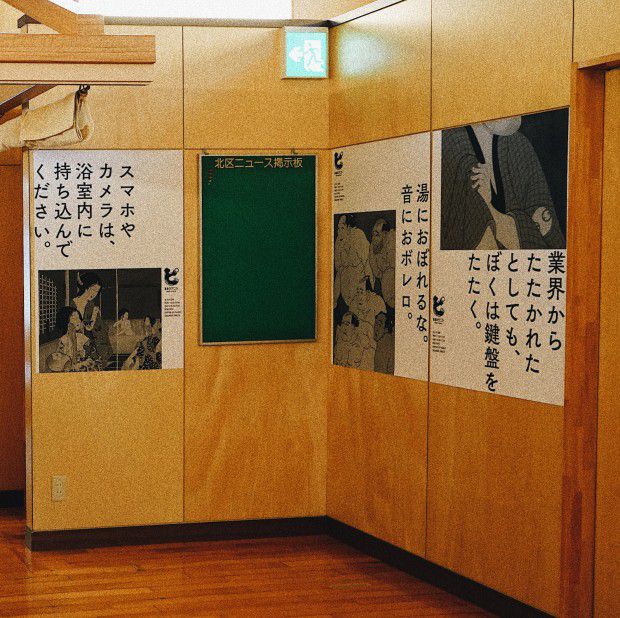
——ポスターはとてもとても良いデザインでした。日本の俳句と伝統的な絵が融合されていましたが、とてもクリエイティブなコンビネーションで興味がそそられます。どのようにそのデザインまで至りましたか?
米津「ポスターは長谷川さんのキャッチコピーと井上さんのデザインによるものです。以下、井上さんにコメントいただきました。
『進め方は、絵とコピーは、別々で考えました。てつじさんに、ラフのデザインをおくって、それをみながらてつじさんがキャッチコピーを複数案考えてくれて、意味や浮世絵のバランスを考えて、キャッチコピーは、僕が選んでポスターにしあげました。ラフのときは、キャッチコピーはちいさかったのですが、キャッチコピーが、素敵なので大きくレイアウトしたいと思いました。
イラストは、日本の伝統的な浮世絵の絵をモノクロ調整して新しく見せたいと思いました。浮世絵もあるいみクラシックみたいなものだと思ったので、共通していたので。今回の企画のように、クラシックを銭湯でやることで新しくみせれたらと思いました』(井上)」
——The posters are impressively good. I see that it is related to the Japanese Haiku with traditional paintings. The combination was creatively intriguing. Would you tell us more about that?
Yonezu: The posters were designed and made by Mr.Hasegawa and Mr.Inoue. Their comment on the process is below.
Inoue: I thought about the pictures and the copy separately while working through the process. I sent a rough design to Tetsuji and he suggested to make multiple copies of the phrases with the pictures. Considering the balance of the meaning with Ukiyo-e, I made the selection of each poster. Those phrases were smaller in the rough designs and I made it big later because they were all beautifully written. And at last I made it monochrome as a new form for Ukiyo-e. I thought that it was matching with the theme of the event, to make new changes based on something classic.
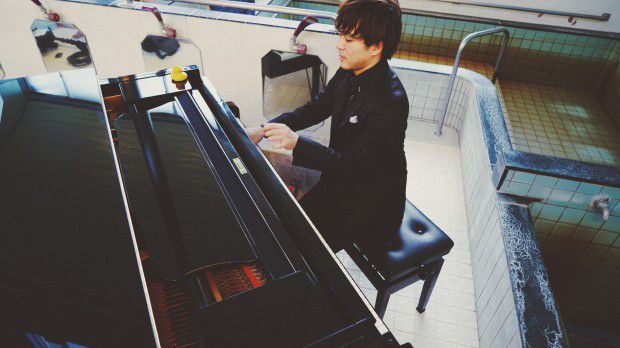
——米津さんは演奏日まで演奏する曲目を決めてらっしゃらなかったと伺いました。普段演奏の曲目はどのように決めてるのでしょうか? 今回のコンサートでは何を演奏されてどのように選ばれましたか? 特にKapustinの変奏曲は、普段米津さんがコンサートで演奏されている曲と違いますか?
米津「普段は演奏会の趣旨に合わせプログラミングしています。ソロでのリサイタルだとしても何かしらのコンセプトを持たせ、演奏会の最初から最後まで聴き終わったときに演奏会全体で一つの作品と捉えられるような一貫性があるプログラムを心がけています。ですが今回の銭湯での演奏会に関しては、当日の朝ピアノを搬入だったことと、銭湯での響きが全く想像できなかったため、当日音出ししてからでないと最終的なプログラムが作れなかったんです。かなり響きすぎるんではないかと予想していて、あまりにテンポの速い曲や激しい曲ですと残響がありすぎて聞き取りにくくなってしまう可能性があったので。実際は素晴らしすぎる音響だったためなんでもOKって感じでしたが!!なので今回はどこかで必ず耳にしているだろう所謂有名曲や『銭湯のピアニスト』と『戦場のピアニスト』をかけて映画に出てきたショパンのノクターン遺作やバラード1番、SNSでリクエストの多かったドビュッシーの月の光やショパン英雄ポロネーズ、そして新しい現代のクラシック作曲家の紹介という意味合いも込めてカプースチンの変奏曲、今後僕の新しいプログラミングのコンセプトでもある編曲物作品からこちらも曲紹介を兼ねラフマニノフ(ヴォロドス編曲)チェロソナタよりアンダンテ、チャイコフスキー(プレトニョフ編曲)くるみ割り人形よりパ・ド・ドュを演奏させていただきました。カプースチンに関しては純粋に僕が好きというのもありますが、こういうクラシックもあるよ、ショパンやリスト、ラフマニノフの時代ではなく今現在も尚クラシック作品は生まれ続けているんだということを感じて欲しかったので選曲いたしました」
——I have heard that you didn’t decide your setlist until the day you performed. How do you usually decide your setlist? What did you play in this concert and why did you choose to play those works? Especially Kapustin’s Variation. Is it different from what you usually play?
Yonezu: I usually decide the setlist according to the specific conditions and purpose of each different concert. Even when it is a solo recital, I have to have a concept which help connects the pieces and make it a consistent program from the beginning through the end. However, this time I could not decide the setlist because I had no idea how it would sound in sentou. I was worried that if the echoes were too dramatic that I might not be able to play something that is loud or with a fast tempo. It ended up pretty good, though! I loved the sound. And so Chopin’s Ballad No.1 and Nocturne were requested to be on the setlist because of the movie “The Pianist” as it matches with the event name. And I got requests from SNS to play Debussy’s Moonlight and Chopin’s Polonaise. I also played works of Rzchmaninov (Vorodos Arrangement) from Cello Sonata Andante, and Tchaikovsky’s Pas de Do from the Nutcraker as these are the new contemporary classical composers that I want to introduce also in my next program. For the Variations, I simply love Kapustin personally, and I wanted the audience to know that classical music is still existing and very alive today, rather than just gone and stays in the times of Chopin or Rachmaninoff. That was how I made the selection.
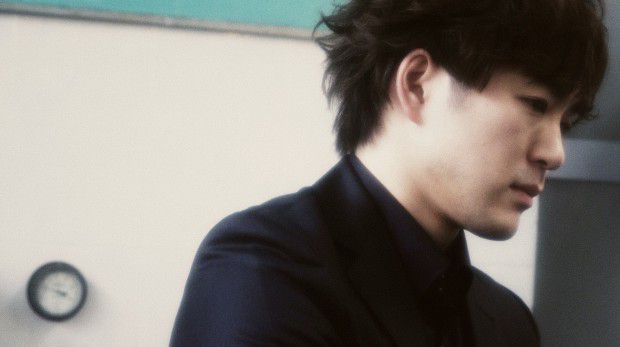
——ピアニストとして、コンサート以外にもクラシック音楽に纏わる様々な活動をされていると思いますが(例えばレッスンをされたり、学生オーケストラとコラボされたり、X-Japanのようなアーティストと演奏されたり、今回のように銭湯ピアニストのイベントを開いたり)、米津さんはどのような21世紀のピアニストになりたいですか?
米津「クラシック音楽の輪を広げ、そして繋げていきたいです。世界には、日本には、素晴らしいピアニストや音楽家が大勢います。そしてきっと何かきかっけさえあればクラシック音楽を好きになってくれるかもしれない予備軍が大勢いると思うんですね。ただそのきっかけが少なすぎると思うんです。なので伝統あるこのクラシック音楽を汚さぬよう常に精進しつつ、でもその見せ方は現代の日本に見合った新しい方法を模索し続け、今後の日本におけるクラシック音楽と聴衆とアーティスト、その間を取り持つ架け橋のようなピアニストになることが夢です」
——As a pianist, you are engaged in various activities related to classical music, besides just concerts. Such as teaching, cooperating with student orchestra group, playing for artists like X-Japan, and holding interesting events like “Pianist of Sentou”. What are your goals as a pianist living in the 21 century?
Yonezu: I would love to enlarge the circle of the power that classical music posses. There are so many wonderful pianists and musicians not just out there in the world, but in Japan, too. There is a large amount of people who love classical music and I feel like something needs to be done. While pursuing traditional classical music constantly, I have been thinking about exploring new ways to match it with contemporary styles in Japan, and build bridges for the future of classical music. I would love to say that my dream is to become a pianist who can connect the audience and the artists in a way like that.
——最後になりますが、次に考えているイベントはありますか?ピアニスト/ミュージシャンとして他にチャレンジしてみたいことはありますか?
米津「銭湯は是非第2弾やりたいですね。そして新しい企画もどんどんやっていきたいです。とはいえ具体的に今の所浮かんでいませんが……(笑)あと、SNSを使った活動もより活発化していきたいです。最後になりますが、やはり今回の銭湯もそうですがサポートしてくださったメンバーやそしてこの企画に興味を持っていただきクラウドファンディングでご支援いただき当日お越しいただきました皆さま、いつも応援してくださっている皆様のサポートがあってこそなりたっている活動です。皆様には心から感謝しております。今後もダイレクトな声やツイッターやインスタといったSNSからのお声を通して皆様と一緒に盛り上げていければなと思っております。どんどん絡んでください!!これからも精進して参りますのでどうぞ宜しくお願い申し上げます。そしてNeoLさん、この度は取材ありがとうございました」
——Last but not least, who do you see yourself as and what do you have in mind for your next event? What else do you want to do as a pianist/musician?
Yonezu: I surely want to do another concert in sentou. And new projects should be started as well. I am not really having any ideas specifically now, though (laugh). I also want to take the advantages of SNS to hold interesting events. And last but not least, I am really thankful for all who helped supporting us on Cloud Funding, and all who shared the same interest. I really want to connect with people on SNS and work out something exciting together. I will definitely keep working hard and pursuing my dreams from now on.
And thank you for having this interview with me, Neol.
photography & text Baihe Sun
米津真浩/Tadahiro Yonezu
1986年2月14日生まれ。千葉県千葉市出身のピアニスト。千葉県立幕張総合高校を経て、東京音楽大学器楽専攻(ピアノ演奏家コース)卒業。
同大学院を首席で修了。大学、大学院在学中特待奨学生として在学。2009年度、同大学ティーチングアシスタント。大学院修了後、異例の若さで母校である東京音楽大学にて非常勤助手として後進の指導に当たり、その後、更なる研鑽を積むため、2013年・2014年度ローム・ミュージックファンデーション奨学生としてイタリアの名門イモラ音楽院へ留学。2007年 第76回日本音楽コンクールピアノ部門 第2位入賞。岩谷賞(聴衆賞)を受賞。東京シティ・フィルハーモニック管弦楽団、東京フィルハーモニー交響楽団、神奈川フィルハーモニー管弦楽団、ニューフィルハーモニーオーケストラ千葉、Gross Vogel Philharmoniker、東京音楽大学ブレイジングオーケストラと共演。
仙台クラシックフェスティバル2011年・2012年出演、成田国際空港ロビーコンサート出演。X JAPAN Toshlのライブサポートメンバーも務める。ソロ、室内楽等の演奏活動だけにとどまらず、クラシック音楽の普及をモットーに音源や記事の提供、TV出演、ボランティア活動、後進の指導、青少年文化センターアーティストとして小学生から高校生までを対象とした学校公演を行ったりと、アウトリーチ活動にも積極的に力を注ぐ。これまでに寺田栄子、高梨淳子、村上隆、弘中孝、Leonid Margariusの各氏に師事。また、M.ラエカッリオ、P.ネルセシアン、S.ドレンスキー、A.サッツ、M.ベロフ、D.ヨッフェ、B.リグット、V.リャードフ、B.ゲツケ、T.ゼリクマン、B.ペトルシャンスキー、P.ドヴァイヨンといった世界的なピアニスト・教授陣の指導を受ける。2015年冬より拠点を日本へ戻し本格的に演奏活動を開始。フジテレビ『金曜日の聞きたい女たち』、テレビ朝日『芸術ハカセ』『ならデキ』等のテレビ番組やラジオといったメディアへの出演も積極的に行う。髙嶋音楽事務所所属。
https://www.tadahiro-yonezu.com
https://twitter.com/yonezutadahiro
